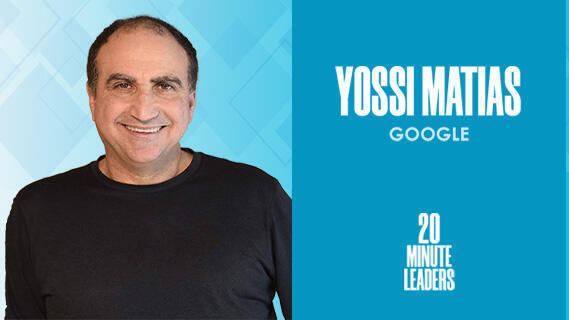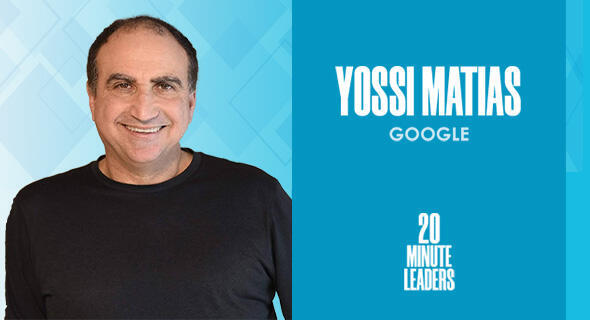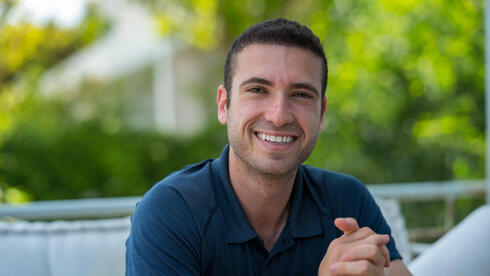
20-Minute Leaders
“If it's going to have high enough impact, it's worth trying”
Though he is a multiple award winner and celebrated researcher, vice president of engineering and research at Google Yossi Matias says his biggest impact has come through helping develop the people he’s worked with.
Though he is a multiple award winner and celebrated researcher, inventor and entrepreneur, Yossi Matias says his biggest impact has come through helping develop the people he’s worked with. Now the vice president of engineering and research at Google, he explains that enabling people is an important part of leading. Matias shares that he has broad interests and likes to carry on multiple projects at once but he says it is also important to find the right mix of focused work and diverse interests. He also explains that his main focus has shifted several times over the years, and many of those experiences prepared him for the next step in his career. Matias says that he has often encountered problems that seemed like they might be too difficult to solve, but if they are going to make a big difference in the world, they are worth working on - things that are believed to be very difficult eventually are often solvable.
Click Here For More 20MinuteLeaders
Yossi Matias, welcome to 20 Minute Leaders, episode 1000. From now on, I'm going to call you Dad. What was the sentiment around computer science when you were studying it?
The basics were already there…. The magic was, and still is, encountering questions of algorithms and problem-solving and the incredible capability of taking a problem and finding the right approach and the opportunity to solve it. I think that computer science is an amazingly creative discipline. I think this combination of having a solution for an intellectual challenge and the solution results in doing something useful and of impact is pretty profound. This is something I enjoy up to today.
Can you paint me the picture of what that experience of being a researcher was like for you personally, at Bell Labs, the Weizmann Institute, or Google, where you continue doing pretty intense research?
One important aspect of research, of course, is to ask the right question. You want to ask questions that matter, that will give you progress that eventually will get you somewhere..
From a personal point of view, the type of questions I was looking at varied over the years. My interests are pretty broad, and my style of study was always a combination of something that I was extremely interested in and focusing on in that particular moment and at the same time there were a few other things of interest to look into. This trade-off between focus and diversity, which we all need to worry about in whatever we do, was always there for me.
When I did my master’s, for example, at the Weizmann Institute, I looked into a problem that touched on many disciplines. It was an amazing opportunity to dive into fractal physics, digital signal processing, cryptography, and security, and to do all that for a problem that was motivated by just encryption of analog video signals.
For my PhD, I decided to switch to a different direction. I decided to do something in theoretical computer science, but I wanted to look into a problem that I thought was going to be important, which was to do parallel algorithms: how to design algorithms for a future case of where we are going to have many, many computers that we can run in parallel.
But after my PhD, my research tastes again shifted. I was looking to see how I can actually find a way to apply what I learned on real parallel computers. This led me into working with the largest commercial parallel computer at the time. I could apply some of my understanding of parallel computation to solve real problems.
One of the magical things about research is the serendipity of how you uncover new opportunities. By solving the problem for parallel computation, I learned that they have even a bigger problem than that, which was how to handle the amount of data that accumulated every day in the data warehouse. Helping them solve that problem led me to also do theoretical research that eventually is the one that led to the ACM award. So we have all these circles that are connected in ways that sometimes are difficult to predict.
I'm going to fast forward a lot. Today you are leading massive teams, thousands of people within Google. What does this role of leader mean to you in others’ journeys?
It's really all about the people, the team, and the culture. One thing you learn as you start growing up professionally is that no matter how smart you are, how creative you are, how much energy you have, and how effective you are, you are going to do much more when you work with teams. The basic thing is to enable, to let people try, and get the best that we can from our teams. The way to do that is to support them as needed. And "as needed" is really something that changes all the time. Sometimes it's to be involved in the right way. Now, I like to be involved in the details, so I need to be disciplined sometimes not to get into the details where I don't need to, both in consideration of my own time, but also to have the teams work in the right way.
One of the things that I'm extremely proud of is to see the development of many people. That's actually where you get all this big impact.
I recall quite a few instances in which the way that you represented entrepreneurial thinking has led to some pretty monumental projects.
Being entrepreneurial is something that I think is unrelated to where you are, if you are in a small company or big company. One of the choices that we need to make all the time is to select the right problems and to take some of the right level of judgment of whether we want to invest in them. You cannot overanalyze it, but you cannot take that as a pass to not do the right level of diligence.
One of the projects I'm really proud of is our efforts around flood forecasting. I'm leading crisis response efforts within Google, which essentially means that people are coming to Google to look for information during crises, so we developed technologies and products and made it part of search and maps so that people can find actionable and helpful information about what's going on. A few years back, I found out that for floods, one of the most significant natural disasters which kills thousands of people every year and affects millions,, we just don't have the right information to present to people. The really helpful information would be for people to know before it hits them. It was on my list as a problem that we need to take a look at, but it seemed to be a very difficult problem and not clear whether we can do anything about it. I asked an engineer to start looking into that part time.
A few months later, he came and showed enough progress on the problem. Within a few months, we had the first pilot. Fast forward, we now have flood forecasting as something that is already launched in India, Bangladesh, and 18 more countries. It covers hundreds of millions of people globally. In 2021, we actually sent out over 115 million notifications to people at risk in India and Bangladesh, alerting them of floods coming their way eight hours or more before the floods got there.
If I think about what are the ingredients that we can take away from this kind of experience, one is that if a problem seems to be too difficult, it doesn't mean that we are not going to be able to solve it. The second one is that if it's going to have a high enough impact, it's worth trying.
Let's dive into what you really spend a lot of time on today: the intersection of artificial intelligence, communication, climate crisis response, and health.
I mentioned floods earlier, and one thing we've seen in the last couple of years is an increase in the frequency and intensity of floods because this is the result of climate change. Similarly, we see more wildfires. We are using AI in order to have real time identification of wildfires so that we can actually help with this. In a different project we are using AI to help reduce the amount of carbon emitted in cities by having more optimized traffic light scheduling. Turns out that this can reduce quite a bit the amount of carbon emitted, and we can actually do that quite effectively.
Health is one area where we know that AI is already and will continue to make tremendous changes. I'll give one example. I was in Thailand just recently visiting some clinics that are implementing one of the technologies that were developed by my team that helps screen for a condition called diabetic retinopathy, which can lead to blindness. If not treated, they can become blind; it's relatively easily treatable. The problem is, of course, identifying it early enough. The good news is that it's easy to identify by experts on an image. The bad news is there's a shortage of over a hundred thousand specialists that are actually doing that. Our team showed that you can do the identification with AI of this condition quite effectively. I visited a clinic that implemented this AI system where I've seen that two minutes after sitting in front of the camera device, people are getting the diagnostics by the AI that tells them whether or not they need to get treatment. Before they had to wait for weeks, if not months to see a specialist if there was one in their area at all.
If you had to conceive a single piece of advice that you would give me at this point, what would it be?
I remember when you were telling me about your habit to meet an interesting person every day and learn from them and leverage on the fact that you were in the Stanford campus with so many interesting people around you. You pivoted in Covid to doing it over video conference and then took this extra step to convert it into 20 Minute Leaders, sharing the information you learned with the world, which was an amazing, wonderful example of taking a crisis and getting the best out of it.
What advice can I give? We both have all these vast interests, and we try to do everything at the same time. Don't stop doing more than one thing at a time because that's what gets you energized. But at any given time, we do need to make our selections of where to focus more and where to less. Same with life: there are certain times that you are working around the clock, but it's not sustainable forever.
Life is not linear, so everything that we do is a learning experience for something else. If you'd asked me many years ago if I was going to be doing what I do today, I wouldn't have been able to anticipate it. Life is full of surprises: not all of them are great, many of them are amazing.
Michael Matias, Forbes 30 Under 30, is a Venture Fellow at Innovation Endeavors as well as investment Venture Partner at Secret Chord and J-Ventures. He studies Artificial Intelligence and Human-Computer Interaction at Stanford University, and was an engineer at Hippo Insurance. Matias previously served as an officer in the 8200 unit. 20MinuteLeaders is a tech entrepreneurship interview series featuring one-on-one interviews with fascinating founders, innovators and thought leaders sharing their journeys and experiences.
Contributing editors: Michael Matias, Megan Ryan

